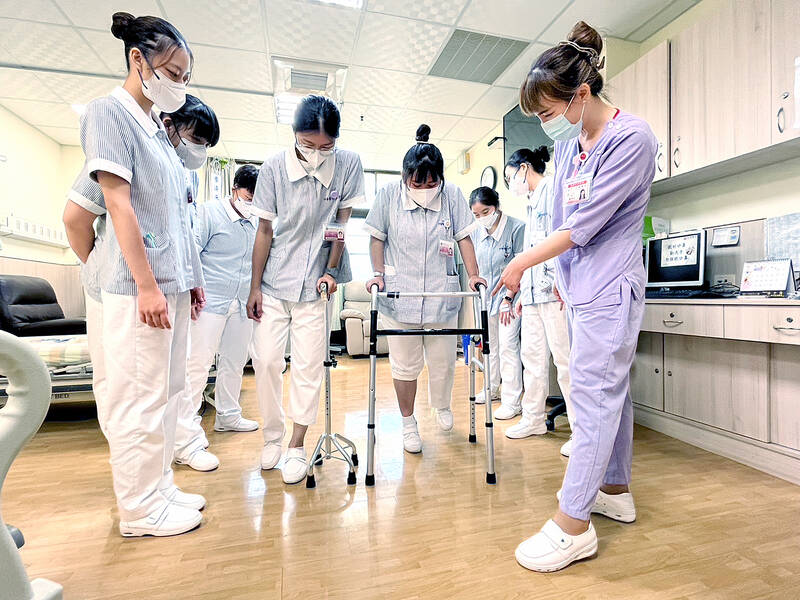The Executive Yuan yesterday approved a proposal to allocate NT$18 billion (US$557.8 million) annually over the next seven years to add at least 67,000 nurses to the workforce by 2030.
“Premier Chen Chien-jen (陳建仁) understands the challenges facing nurses, who are integral to the nation’s healthcare system, and deserve our respect and admiration. The Ministry of Health and Welfare should build a safe and reasonable work environment for nurses by improving their salaries, benefits and labor conditions,” Executive Yuan spokesman Lin Tzu-luen (林子倫) told a news conference following the weekly Cabinet meeting.
Based on the ministry’s presentation, Taiwan would need between 240,000 and 260,000 nurses between now and 2030 to meet healthcare demands.

Photo courtesy of Sinlau Christian Hospital
Ministry data showed that the nation has about 186,000 licensed nurses, implying a shortage of 55,000 to 74,000 professionals.
From this year to 2025, the ministry would set nurse-to-patient ratios for day shifts, night shifts and late-night shifts, and reward hospitals for meeting these ratios, it said.
Nurses working on night shifts would receive an additional subsidy of NT$400 to NT$600 per day, while those on late-night shifts would receive NT$600 to NT$1,000, the ministry said.
Nurses would see their monthly salaries increase by NT$8,000 to NT$20,000 if they work night shifts or late-night shifts for 20 straight days, it said.
Hospitals that meet nurse-to-patient ratios set by the ministry and create a nursing-friendly work environment would be given a bonus of up to NT$1 million, which should be used to reward nurses.
Apart from subsidies, the ministry aims to attract more people to become registered nurses by raising the percentage of nurses who are also civil servants.
Meanwhile, the government-administered tests for registered nurses would be held more frequently, and an integrated platform to educate, test and recruit registered nurses would be established, it said.
The ministry said that it would apply technology to reduce the workload for registered nurses, and that it would recruit clinical teachers for nursing novices.
The Ministry of Education is to allocate more funding and resources to nursing schools, the health ministry said, adding that it would begin enforcing inpatient integrated care plans at hospitals.
Implementing all the strategic plans proposed by the health ministry would require an annual funding of NT$18 billion in total, NT$2.5 billion and NT$3.5 billion of which would be used to offer additional funds for registered nurses working on night shifts or late shifts, and reward hospitals for meeting nurse-to-patient ratios.
The strategic plans, when implemented successfully, should increase the number of nursing professionals by 67,000 to 78,000 from next year to 2030, the ministry said.
The health ministry said it would negotiate over the funding for these plans when the Legislative Yuan reviews its budget proposals for the National Health Insurance System, adding that the nurse-to-patient ratios would be set by the end of December and implemented next year.

Taiwan is gearing up to celebrate the New Year at events across the country, headlined by the annual countdown and Taipei 101 fireworks display at midnight. Many of the events are to be livesteamed online. See below for lineups and links: Taipei Taipei’s New Year’s Party 2026 is to begin at 7pm and run until 1am, with the theme “Sailing to the Future.” South Korean girl group KARA is headlining the concert at Taipei City Hall Plaza, with additional performances by Amber An (安心亞), Nick Chou (周湯豪), hip-hop trio Nine One One (玖壹壹), Bii (畢書盡), girl group Genblue (幻藍小熊) and more. The festivities are to

Auckland rang in 2026 with a downtown fireworks display launched from New Zealand’s tallest structure, Sky Tower, making it the first major city to greet the new year at a celebration dampened by rain, while crowds in Taipei braved the elements to watch Taipei 101’s display. South Pacific countries are the first to bid farewell to 2025. Clocks struck midnight in Auckland, with a population of 1.7 million, 18 hours before the famous ball was to drop in New York’s Times Square. The five-minute display involved 3,500 fireworks launched from the 240m Sky Tower. Smaller community events were canceled across New Zealand’s

‘IRRESPONSIBLE’: Beijing’s constant disruption of the ‘status quo’ in the Taiwan Strait has damaged peace, stability and security in the Indo-Pacific region, MOFA said The Presidential Office yesterday condemned China’s launch of another military drill around Taiwan, saying such actions are a “unilateral provocation” that destabilizes regional peace and stability. China should immediately stop the irresponsible and provocative actions, Presidential Office spokeswoman Karen Kuo (郭雅慧) said, after the Chinese People’s Liberation Army (PLA) yesterday announced the start of a new round of joint exercises around Taiwan by the army, navy and air force, which it said were approaching “from different directions.” Code-named “Justice Mission 2025,” the exercises would be conducted in the Taiwan Strait and in areas north, southwest, southeast and east of Taiwan

UNDER WAY: The contract for advanced sensor systems would be fulfilled in Florida, and is expected to be completed by June 2031, the Pentagon said Lockheed Martin has been given a contract involving foreign military sales to Taiwan to meet what Washington calls “an urgent operational need” of Taiwan’s air force, the Pentagon said on Wednesday. The contract has a ceiling value of US$328.5 million, with US$157.3 million in foreign military sales funds obligated at the time of award, the Pentagon said in a statement. “This contract provides for the procurement and delivery of 55 Infrared Search and Track Legion Enhanced Sensor Pods, processors, pod containers and processor containers required to meet the urgent operational need of the Taiwan air force,” it said. The contract’s work would be